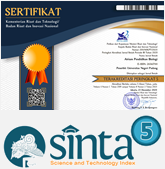URGENCY ANALYSIS OF STUDENT WORKSHEET DEVELOPMENT CONTAINED 4C SKILLS IN BIOLOGY SUBJECT
Abstract
Keywords
Full Text:
FullpaperReferences
Choo, S.S.Y., Jerome, I. R., Elaine, H. J. Y., dan Henk, G. S. 2011. Effect of Worksheet Scaffold on Student Learning in Problem Based Learning. Journal Adv in Health Science Education Springerlink, Vol. 16, No. 1: 517-528.
Darise, G. N. 2019. Implementasi Kurikulum 2013 Revisi Sebagai Solusi Alternatif Pendidikan di Indonesia dalam Menghadapi Revolusi Industri 4.0. Jurnal Ilmiah Iqra, Vol. 13, No. 2: 41-53.
Farida, N., Bhakti, K., dan Kasrina. 2019. Pemahaman Konsep Bryophyta dengan Menggunakan LKPD Berbasis Observasi pada Peserta Didik Kelas X SMAN 1 Argamakmur. Jurnal Pendidikan dan Pembelajaran Biologi, Vol. 3, No. 1: 108-115.
Lufri., Ardi., Relsas Y., Arief M., dan Rahmadhani F. 2020. Metodologi Pembelajaran: Strategi, Pendekatan, Model, Metode Pembelajaran. Malang: IRDH.
Makhrus, M., Ahmad, H., Abdul, S., Syamsul, B., dan Muntari. 2018. Identifikasi Kesiapan LKPD Guru Terhadap Keterampilan Abad 21 pada Pembelajaran IPA SMP. Jurnal Ilmiah Profesi Pendidikan, Vol. 3, No. 2: 124-128.
Mawadah, R., Zulyusri, Relsas, Y., dan Sa’diatul, F. 2021. Needs Analysis of the Development of Student Worksheets Based on High Order Thinking Skills On the Interaction of Living Things with the Environment. Jurnal Atrium Pendidikan Biologi, Vol. 6, No. 1: 1-6.
Rahmi, A., dan Suparman. 2019. Analisis Kebutuhan Modul dengan Pendekatan CTL Untuk Meningkatkan Motivasi Belajar dan Keterampilan 4C pada Peserta Didik, Prosiding Sendika. Vol. 5, No. 1: 121-126.
Rohmah, M. 2020. Evaluasi Pendidikan Ekonomi pada Kurikulum 2013 Ditingkat Sekolah Menengah Atas (SMA). Jurnal Ilmiah Pendidikan dan Ekonomi, Vol. 4, No. 1: 56-70.
Syamsu, F. D. 2020. Pengembangan Lembar Kerja Peserta Didik Berorientasi Pembelajaran Discovery Learning untuk Meningkatkan Keterampilan Berpikir Kritis Siswa. Genta Mulia, Vol. 11, No. 1: 65-79.
Sulistyorini, S., Harmanto., Zaenal, A., dan Jaino. 2018. Pengembangan Lembar Kerja Peserta Didik (LKPD.Tematik Terpadu Mengintegrasikan Penguatan Pendidikan Karakter (PPK) dan Literasi Siswa SD Di Kota Semarang. Jurnal Kreatif, Vol. 8, No. 4: 138–147.
Utama, Z. P., dan Festiyed. 2020. Analisis Validitas dan Praktikalitas Pengembangan Lembar Kerja Peserta Didik Berbasis Keterampilan 4C melalui Model Research Based Learning Untuk Pembelajaran Fisika. Jurnal Penelitian Pembelajaran Fisika, Vol. 11, Vol. 2: 179-184.
DOI: http://dx.doi.org/10.24036/apb.v6i3.11497




